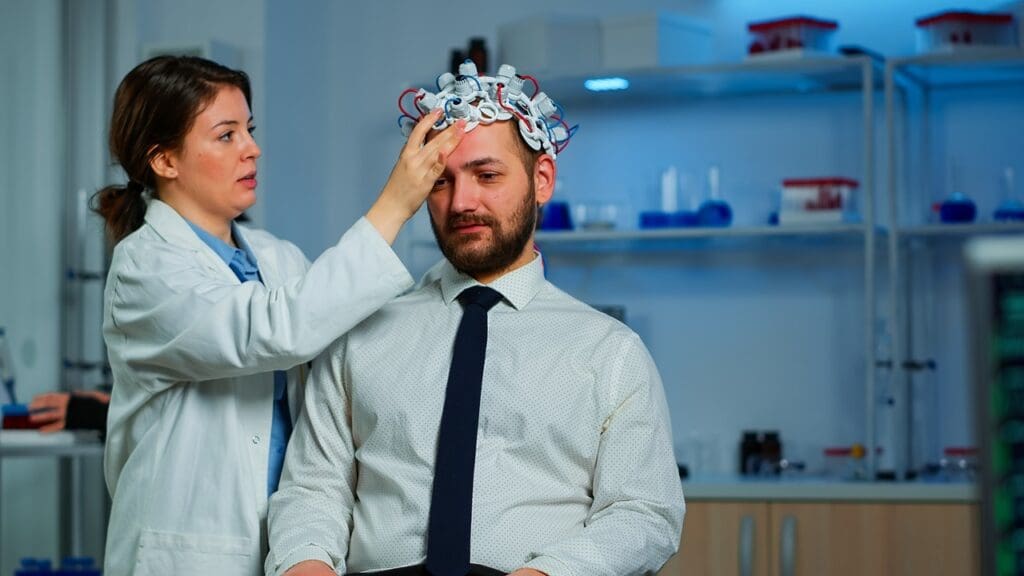
Having brain tumor surgery can be scary. Knowing how long it takes is key to getting ready.
At Liv Hospital, we focus on giving our patients the best care. The time it takes for brain surgery changes a lot. It depends on the tumor’s size, where it is, and what kind it is. It also depends on the surgery method used.
Most craniotomy surgeries, a common way to remove brain tumors, take 4 to 6 hours. Our skilled neurosurgeons and medical team work hard. They use the latest techniques and tools to help our patients get the best results.
Key Takeaways
- The time for brain surgery changes based on the tumor and surgery method.
- Liv Hospital offers top-notch care with the latest methods.
- Most craniotomy surgeries last 4 to 6 hours.
- Our team of experienced neurosurgeons and medical staff are dedicated to delivering high-quality care.
- Advanced techniques and technologies are used to ensure the best outcomes.
Understanding Brain Tumors and Surgical Intervention

Brain tumors, whether benign or malignant, need precise diagnosis and treatment. Often, this means surgery. At Liv Hospital, we know how complex brain tumors are. We also know how important it is to find the right treatment.
Brain tumors are abnormal cell growths in the brain. The type and characteristics of a tumor are key in deciding treatment. The type and characteristics of a brain tumor are essential factors in determining whether surgery is necessary.
Types of Brain Tumors and Their Characteristics
Brain tumors are divided into benign and malignant types. Benign tumors are non-cancerous and grow slowly. Malignant tumors are cancerous and grow fast. Knowing a tumor’s specific characteristics is vital for a good treatment plan.
| Tumor Type | Characteristics | Typical Treatment Approach |
|---|---|---|
| Benign | Non-cancerous, slow-growing | Surgery, monitoring |
| Malignant | Cancerous, rapid growth | Surgery, radiation, chemotherapy |
When Surgery Becomes Necessary
Surgery is often the main treatment for many brain tumors. The decision to have surgery depends on several factors. Our team at Liv Hospital works closely with patients to find the best treatment. We consider the latest research and advancements in neurosurgery.
When a brain tumor is found, our specialists check if surgery is needed. They look at the tumor’s size, location, and how aggressive it is. They also consider the patient’s overall health.
Factors That Influence Brain Tumor Surgery Duration

Many things affect how long brain surgery for a tumor takes. At Liv Hospital, our skilled neurosurgeons look at each patient’s case closely. They plan the best and safest way to operate.
Tumor Size and Location
The size and where a brain tumor is located greatly affect surgery. Larger tumors or those in key brain areas make surgery more complex and take longer. Tumors near important brain parts need a careful, detailed approach. This can make surgery longer.
Tumor Type and Malignancy
The type and how serious a brain tumor is also matter. Malignant tumors often need a bigger surgery to remove all cancer. The surgeon aims to take out as much tumor as they can without harming healthy brain.
Patient’s Overall Health
A patient’s health and any past medical issues can change how long surgery and recovery take. Patients with health problems might need extra care during surgery. This can affect how long the surgery lasts.
Our neurosurgical team at Liv Hospital considers these factors. They give each patient the care they need for the best surgery results.
How Long Does Brain Surgery Take for Brain Tumor: Typical Timeframes
Knowing how long brain surgery for tumors takes is key for patients and their families. At Liv Hospital, we aim to give clear, detailed info. This helps our patients feel more at ease and ready for what’s ahead.
The time needed for brain surgery can change a lot. It depends on the tumor’s type and how complex it is. Most surgeries last between 4 and 6 hours. But, many things can affect how long it takes, which we’ll look at next.
Average Duration for Standard Procedures
For standard surgeries like a craniotomy, the time is usually 4 to 6 hours. Our surgical team works hard to get the best results for the patient. This time includes getting ready, the surgery itself, and watching over the patient as they start to recover.
| Procedure Type | Average Duration |
|---|---|
| Craniotomy | 4-6 hours |
| Complex Tumor Removal | 6-8 hours |
Duration Variations Based on Complexity
For more complex surgeries, like tumors near important brain areas, the time can go up to 8 hours or more. Our skilled team is ready for all kinds of cases. We make sure each patient gets care that fits their unique needs.
Using advanced methods like intraoperative mapping can also affect surgery time. But, these methods are vital. They help remove the tumor carefully, keeping healthy tissue safe.
Standard Craniotomy: Duration and Procedure Details
A standard craniotomy is a complex surgery that needs meticulous planning and execution. It involves temporarily removing a part of the skull to access the brain. This allows surgeons to remove tumors or address other brain issues.
Pre-Surgical Preparation Time
Pre-surgical preparation is key to ensure patient safety and procedure success. It includes tests and evaluations like imaging studies and neurological assessments. At Liv Hospital, we follow the highest care standards, giving our patients comprehensive and compassionate treatment.
The 4-6 Hour Surgical Window
The standard craniotomy lasts 4 to 6 hours. The time can change based on the case’s complexity, tumor size and location, and patient health. Our surgical team is experienced and skilled, ensuring the surgery is done efficiently and effectively.
Post-Operative Monitoring in the Operating Room
Post-operative care in the operating room and monitoring in the intensive care unit are vital. Our team watches the patient’s vital signs and neurological status closely. We address any concerns quickly to help the patient recover smoothly. This shows our dedication to world-class healthcare.
Brain Tumor Removal Procedures and Techniques
The way we remove brain tumors changes based on the tumor’s type and where it is. Each patient is different, so our neurosurgeons adjust their methods to fit each case.
Complete vs. Partial Resection of Brain Tumors
Choosing between removing the whole tumor or just part of it depends on several things. This includes the tumor’s size, type, and how close it is to important brain parts. Complete resection is best for tumors that are not harmful and can be easily removed. But for tumors that are hard to get to or near important brain areas, partial resection might be needed.
| Resection Type | Tumor Characteristics | Surgical Goal |
|---|---|---|
| Complete Resection | Benign or well-circumscribed | Remove entire tumor |
| Partial Resection | Deeply embedded or near vital areas | Reduce tumor burden, preserve function |
Surgical Margins and Preservation of Healthy Tissue
Our main goal in brain tumor surgery is to take out as much of the tumor as we can. At the same time, we work hard to keep the healthy tissue around it safe. We use advanced surgical techniques like intraoperative mapping to help. This lets us see and avoid important brain areas and functions as we operate.
We use the latest technology and our skills to get the best results for our patients. Keeping healthy tissue safe is key to keeping brain function and improving life quality.
Frontal Lobe Tumor Surgery: Special Considerations
Frontal lobe tumor surgery is complex. It aims to remove tumors while keeping important brain functions. The frontal lobe handles key tasks like movement, language, and making decisions.
Surgical Approach
We use advanced imaging and brain mapping during surgery. This personalized approach helps us tailor the surgery to each patient’s needs.
Our team works with neurologists and rehab specialists for a complete treatment plan. We carefully plan the surgery based on the tumor’s location, size, and type.
Duration and Recovery
The surgery’s length varies with the case’s complexity and the patient’s health. It usually takes 4 to 6 hours.
Recovery plans are made for each patient. We watch them closely after surgery to avoid complications and support their recovery. Rehabilitation is key to helping patients regain lost abilities and adjust to changes.
Minimally Invasive Brain Tumor Procedures and Their Duration
Minimally invasive brain tumor procedures have changed neurosurgery a lot. They help patients recover faster and have fewer complications. We use these new methods to get the best results for our patients.
These procedures aim to cause less damage and help healing happen quicker. With special tools and techniques, we can make surgeries shorter and recovery times less.
Transsphenoidal Surgery: The 3-4 Hour Approach
Transsphenoidal surgery is a minimally invasive way to remove some brain tumors. It goes through the sphenoid sinus, avoiding more invasive cranial surgery. This surgery usually takes 3 to 4 hours.
| Procedure | Typical Duration | Benefits |
|---|---|---|
| Transsphenoidal Surgery | 3-4 hours | Less invasive, reduced recovery time |
| Endoscopic Procedures | 2-3 hours | High precision, minimal tissue damage |
| Laser-Assisted Procedures | 2-4 hours | Precise tumor removal, reduced bleeding |
Endoscopic and Laser-Assisted Procedures
Endoscopic and laser-assisted procedures are also used for brain tumors. They use an endoscope or laser for precise tumor removal. These procedures usually last from 2 to 4 hours.
Using these advanced techniques, we can get better results for our patients. We also reduce the risks of traditional open surgeries.
Brain Biopsy Procedures: Shorter Surgical Interventions
A brain biopsy is a surgery that helps doctors understand brain tumors better. It takes a sample of brain tissue for tests. This helps doctors diagnose and treat brain tumors.
The 2-3 Hour Timeframe for Diagnostic Procedures
Brain biopsy surgeries are shorter than some other brain surgeries. They usually last 2 to 3 hours. The time needed can change based on the case’s complexity and the methods used.
At Liv Hospital, we use the latest technology and skilled neurosurgeons. This ensures the surgery is done safely and efficiently.
The following table outlines the typical steps involved in a brain biopsy procedure and their associated timeframes:
| Procedure Step | Typical Timeframe |
|---|---|
| Preparation | 30 minutes |
| Surgical Intervention | 2-3 hours |
| Recovery Monitoring | 1-2 hours |
Recovery After Brain Biopsy
Recovering from a brain biopsy is usually quick. Most patients go home the same day or the next day. We offer detailed care and support to help with recovery.
Patients are watched for any issues and pain is managed to keep them comfortable.
Key aspects of recovery include:
- Monitoring for any complications
- Managing pain
- Following up with care instructions
By following these steps, patients can lower the risk of problems and recover well.
Advanced Surgical Techniques and Their Impact on Duration
Advanced surgical techniques have changed neurosurgery, bringing hope to those with brain tumors. These new methods make surgeries more precise and safe. They also change how long the surgery lasts.
We use many advanced techniques to better our results. One key method is intraoperative mapping and monitoring. It helps us keep important brain areas safe during surgery.
Intraoperative Mapping and Monitoring
Intraoperative mapping and monitoring use special tools to map brain functions live during surgery. This helps us avoid harming key areas, leading to better outcomes. Using this method can add about 30 minutes to an hour to the surgery time.
Computer-Assisted Navigation Systems
Computer-assisted navigation systems guide us during brain surgery, making it more precise and safer. They use advanced imaging to create detailed brain maps. This helps us remove tumors more accurately.
| Technique | Impact on Surgery Duration | Benefits |
|---|---|---|
| Intraoperative Mapping | Additional 30 minutes to 1 hour | Preserves critical brain areas |
| Computer-Assisted Navigation | Varies, typically 15-30 minutes | Enhances precision and safety |
| Awake Craniotomy | Can extend surgery by 1-2 hours | Allows real-time monitoring of brain function |
Awake Craniotomy and Its Timeline
Awake craniotomy keeps the patient awake during parts of the surgery. This lets us watch brain functions live, making sure we protect important areas. Though it can make the surgery last 1-2 hours longer, it’s very beneficial for keeping brain function intact.
Recovery Timeline After Brain Tumor Surgery
Recovering from brain tumor surgery takes time, patience, and care. At Liv Hospital, we create detailed recovery plans for our patients. This helps them get the best results.
Immediate Post-Operative Period
The first days after surgery are very important. Patients stay in the ICU to watch for any problems. Our team manages pain, swelling, and other issues carefully.
We focus on post-operative care that meets each patient’s needs. This helps them start their recovery smoothly.
First Weeks of Recovery
In the first weeks, patients need to rest and slowly get back to normal. This time is key for healing and avoiding complications. We guide them on post-operative rehabilitation.
We also support them through this tough time.
Long-Term Recovery: 3-6 Months and Beyond
Recovery can take months, with big improvements seen in 3 to 6 months. Patients have follow-up visits and may join rehab to regain strength and brain function. Our care goes beyond surgery, focusing on long-term recovery and overall health.
Knowing the recovery timeline and getting the right support helps patients overcome brain tumor surgery recovery. They can achieve great results.
Conclusion
Brain tumor surgery is complex and tailored to each patient. The time it takes and the results depend on the tumor’s size, location, type, and the patient’s health. At Liv Hospital, we focus on top-notch care using the latest neurosurgery techniques. We aim for the best results for our patients.
Our team offers caring and detailed care from start to finish. We know recovery is key after brain tumor surgery. Our specialists keep a close eye on patients’ progress and help with any worries.
At Liv Hospital, we’re known for our high-standard care. We’re a go-to place for advanced medical treatments. Our team can handle many types of brain tumor surgeries. We make sure our patients get the best care possible.
How long does brain surgery for a brain tumor typically take?
Brain surgery for a tumor can last from 4 to 6 hours. This is for common procedures like craniotomy. For more complex cases, it might take up to 8 hours.
What factors influence the duration of brain tumor surgery?
Several things affect how long surgery takes. These include the tumor’s size, location, and type. The patient’s health and the surgery method also play a role.
How long does a craniotomy procedure take?
A craniotomy usually takes 4 to 6 hours. But, it can vary based on how complex the case is.
What is the difference between complete and partial resection of a brain tumor?
Complete resection tries to remove as much of the tumor as possible. Partial resection removes a part of the tumor. This is often to ease symptoms or shrink the tumor.
How long does a brain biopsy take?
Brain biopsies are less invasive. They usually take 2 to 3 hours to complete.
What are the advantages of minimally invasive brain tumor procedures?
Procedures like transsphenoidal surgery and endoscopic methods are less invasive. They lead to quicker recovery and less damage to tissue.
How long does it take to recover from brain tumor surgery?
Recovery from brain tumor surgery is slow. But, most people see big improvements in 3 to 6 months.
What is the role of intraoperative mapping and monitoring in brain surgery?
Intraoperative mapping and monitoring help surgeons avoid damaging important brain areas. This leads to better results and fewer complications.
Can advanced surgical techniques extend the duration of brain surgery?
Yes, using advanced techniques like intraoperative mapping can make surgery longer. But, they help improve outcomes.
How long does frontal lobe tumor surgery take?
Surgery for frontal lobe tumors varies. It depends on the tumor and the patient’s health. Surgeons plan carefully to remove the tumor while preserving important functions.
References
- Neurosurgeons of New Jersey (How Long is Surgery to Remove a Brain Tumor) : https://www.neurosurgeonsofnewjersey.com/blog/how-long-is-surgery-to-remove-a-brain-tumor
- Aaron Cohen-Gadol, MD (Glioma Surgical Recovery) : https://www.aaroncohen-gadol.com/en/patients/glioma/treatment/surgical-recovery
- The Brain Tumour Charity (Craniotomy for Adults) : https://www.thebraintumourcharity.org/brain-tumour-diagnosis-treatment/treating-brain-tumours/adult-treatments/neurosurgery-adults
- University of Utah Health (Skull Base Tumors and Meningioma Surgery) : https://healthcare.utah.edu/skull-base-tumors/meningioma/surgery
- Dana-Farber Cancer Institute (Brain Tumor Surgery FAQs) : https://www.dana-farber.org/brain-tumor-center/information-for-new-patients-and-families/brain-tumor-surgery-faqs





